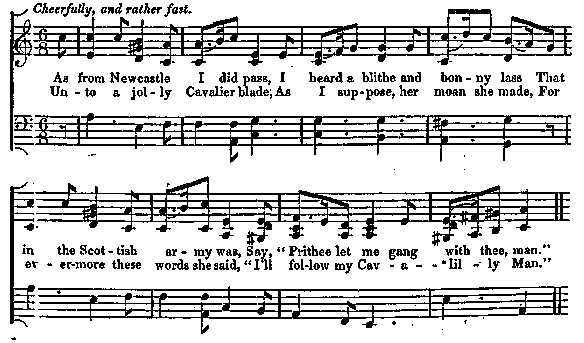Popular Music Of The Olden Time Vol 2
Ancient Songs, Ballads, & Dance Tunes, Sheet Music & Lyrics - online book
| Share page | Visit Us On FB |
|
THE COMMONWEALTH. |
441 |
||
|
|
|||
|
In Harl. MSS., No. 6,913, is a satirical song by Lord Rochester, to this tune; commencing— "Have you heard of a Lord of noble descent, Hark ! how the bells of Paradise ring; As a mask of his valour, to Tangier he went," &c. In 120 Loyal Songs, 1684, are the following:—
P. 196. " A new Litany to be sung in all Conventicles, for instruction of the Whigs. Tune, Gavalilly man." Commencing—
" From councils of six, when treason prevails."
P. 213. " A song of The Light of the nation turn'd into darkness. Tune called Cavalilly man." Commencing;—
" Come, all you caballers and parliament votes." In the editions of 1685 and 1694 are several other songs, and the tune is, in one instance, entitled Which nobody can deny. The song is on Titus Oates. " Gates well thrashed; being a dialogue between a country farmer and his man, Jack." , The first stanza, and one other, end with the line, " Which nobody can deny, sir;" from which, I assume, the name is (improperly) given to the tune.-
The original ballad is entitled " The North-country Maid's Resolution, and Love to her Sweetheart: To a pleasant new Northern tune." "Printed for F. Grove on Snow hill." It consists of eleven stanzas of eight lines, besides the following burthen of four, to each verse:—
" 0 my dainty Cavalilly man, For God's cause and the Protestants',
My finnikin Cavalilly man, I prithee le.' me gang with thee, man."
I imagine that there must have been longer versions of the tune than any I have found, because, if only consisting of eight bars, it would be necessary to sing these three times over for every stanza, including the burthen. |
|||
|
|
|||
 |
|||